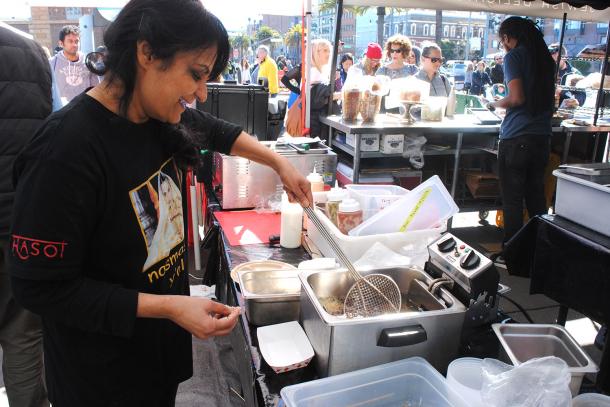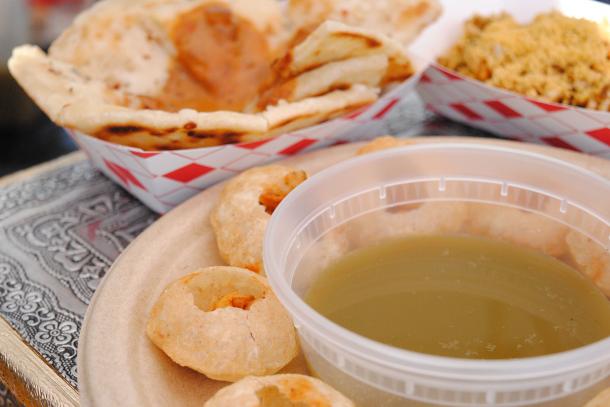From Mumbai to California, Rasoi Shares the Flavors of an Immigrant’s Journey
Kayla Abe, CUESA Staff
February 17, 2017

If cuisine is a form of storytelling, Rasoi is Heena Patel’s autobiography.
“My food is influenced by how I’ve traveled,” says Heena, who fuses the many flavors of her immigration journey, from Asia to Europe and now California, in her cooking. “I am trying to put a twist, creating my own version of the food I grew up with.”
To the uninitiated, the cuisine of Rasoi may appear strictly Indian. But in the curries and kebabs, you’ll taste rural Gujarat incorporating Bay Area produce, with a sprinkle of Mumbai and traces of London. Rasoi’s hybrid cuisine is both quintessentially Heena and 100% American. “I don’t want to stick to just the north part of India or the south part,” Heena says. “I’ve been exposed to many different regions, and I want to show it in my food.”
Rich in Heritage
As a young girl, Heena enjoyed some of her nation’s best cuisine on the streets outside her Mumbai apartment. But it was on holidays and summer vacations back to her hometown in the Gujarat farmlands of Western India that she connected most with her culinary heritage.
“Patels are land owners, meaning we are farmers,” explains Heena. “My family grew up having a big house in the middle of a farm with land all around us. We grew mangoes, potatoes, onions, lots of greens, seasonal fava beans. We had seven or eight cows in the back of our house, so every day we’d take the fresh milk, boil it, and pasteurize it at home. We would churn our own butter.”
Between making their own food and bartering with neighbors, the Patels found all their culinary needs satisfied. “We never went out to restaurants, never had cakes or biscuits,” Heena remembers. “But we never felt deprived. Our family was not rich, but we were rich in produce and in heritage.”
Building Kitchen Confidence
In such a food-centric community, cooking was a shared effort: everyone held the title of chef, and recipes were stored in muscle memory, passed from family member to family member. “My aunts, my uncles,” says Heena, “they all cook with confidence. There are no measurements—it’s all eyeballing. I learned to use my fingers instead of measuring half a teaspoon.”
Despite learning to cook under this expert guidance, it took Heena years to feel confident in her cooking ability. When she moved to the Bay Area, she enrolled in La Cocina, a business incubator program focusing on immigrant women, which helped her find her bearings and launch Rasoi. “Before La Cocina, I never valued my talent,” Heena admits. “I know I can cook good food—I always heard that from my family and friends—but how to make that skill help me and my family? When I approached La Cocina, I didn’t have any culinary degree. But they saw the talent and they saw my passion, and I’m grateful for that.”
At Rasoi, Heena applies the off-the-cuff cooking philosophy she learned from her family, while experimenting with new ingredients. Without India’s tropical crops locally available, Heena makes it a creative exercise to balance using California produce and honoring her culinary heritage.
“That’s the challenge I accept as a chef,” says Heena. “We don’t use mushrooms or Brussels sprouts in India. But here, even with potatoes, there are so many varieties! If it doesn’t come out as I expected, I don’t mind being wrong. We live in a paradise of produce, and I feel like a student every day.”
Food Speaks Louder Than Words
Heena’s background enriches her cuisine, but she didn’t always recognize her culture as an asset. “Most of my life I’ve felt like an outsider because I’m an immigrant,” she notes. When trying to connect Westerners to her homeland through good food, Heena realizes that her nostalgia doesn’t always translate to them.
“It’s hard because they don’t feel the same excitement I feel when I say, ‘Eat my pav bhaji,’” she explains. Pav bhaji is an iconic Mumbai street food, but most Westerners have never heard of it. “Sometimes it’s challenging, but that’s a given because I am trying to introduce something new.”
Appealing to the curiosity in others allows her to converse in the way she knows best: through people’s stomachs. “Food gives me a voice and helps me reach out and connect to strangers on an everyday level,” she says.
Today, Rasoi has become Heena’s platform for activism. She hopes her food can both nourish bodies and bridge understanding at a time when she fears for her children’s safety based on the color of their skin. “The message I want to give right now as an immigrant woman is that I am strong, and I have a hope, and I’m not going to be afraid,” Heena says. “And I want my kids to be strong. I want them to know they can be who they are.”
Sharing her personal history through her food at Bay Area farmers markets is a vulnerable act. Yet, as strangers taste Heena’s cooking and talk with her face-to-face, they find a story not unlike their own—that of a person fundamentally shaped by her roots. “Food is more important now than any other time,” she says. “I’m not a public speaker, and maybe not outspoken, but I can speak loud with my food.”
Find Rasoi at the Ferry Plaza Farmers Market on Tuesdays and Saturdays. You can also meet Heena on Saturday, February 18, at her free cooking demo at the CUESA Classroom at 10:30 am.

Topics: Building Equity program, Chef, Culinary, Small business



